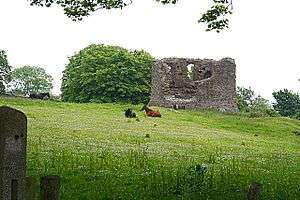Carra Castle, Antrim
| Castle Carra | |
|---|---|
 | |
 | |
| General information | |
| Type | Ruined castle |
| Location | Near Cushendun, County Antrim, Northern Ireland |
| Coordinates | 55°7′57.5″N 6°2′29.4″W / 55.132639°N 6.041500°WCoordinates: 55°7′57.5″N 6°2′29.4″W / 55.132639°N 6.041500°W |
Carra Castle or Castle Carra (Irish: Caisleán Carrach) is a ruined castle, just north of Cushendun, County Antrim, Northern Ireland. It dates to around the early 14th century.[1] The castle lies in a field near the coast and the harbour of Cushendun, known as Murloch Bay.[2] The site had once been used during medieval times as a children's cemetery.[1]
Etymology
Carra may be a corruption of "Carey".[2] It may have been known as Goban Saer's Castle.[3]
History
The castle was once occupied by Irish king Shane O'Neill, and Sorley Boy McDonnell was held as a prisoner here in 1565.[1] In 1567, two years after being defeated by O'Neill, the McDonnells entertained him in Castle Carra during two days of hunting and feasting. However, on the third day, 2 June, during a quarrel, they stabbed O'Neill to death to avenge their earlier defeat and sent his head to the English representatives of Queen Elizabeth in Dublin Castle.[1]
In 1585, Donnell Gorm MacDonnell was besieged by the English,; his father, Sorley Boy landed near the castle and drove off the besiegers.[4] Around 1730, it was known to have been occupied by the Lynch family.[5] Today the castle is in ruins and overgrown with ivy.[6]
Architecture and fittings
The house has the characteristics of a hall house, but its outside dimensions are that of a tower house.[7] What remains are the ruins of a 16th-century square tower house built over a Mesolithic flint working site.
References
- 1 2 3 4 "Castle Carra". Castles.nl. Retrieved 29 May 2011.
- 1 2 Wright, George Newenham (1823). A guide to the Giant's Causeway and the north-east coast of ... Antrim. p. 58. Retrieved 29 May 2011.
- ↑ The Gentleman's magazine. F. Jefferies. 1853. p. 503. Retrieved 29 May 2011.
- ↑ "Castle Carra". The Glens of Antrim Historical Society. Retrieved 29 May 2011.
- ↑ Burke, John Bernard (1852). A genealogical and heraldic dictionary of the peerage and baronetage of the British Empire. Colburn. p. 99. Retrieved 29 May 2011.
- ↑ Gallagher, Lyn; Rogers, Dick (1992). Castle, coast, and cottage: the National Trust in Northern Ireland. Blackstaff Press. p. 43. ISBN 978-0-85640-497-9. Retrieved 29 May 2011.
- ↑ McNeill, T. E. (1997). Castles in Ireland: feudal power in a Gaelic world. Psychology Press. pp. 204–. ISBN 978-0-415-16537-2. Retrieved 30 May 2011.